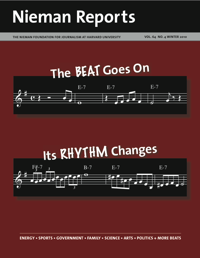Editor’s Note: Our sister publication Nieman Reports is out with its winter issue, which focuses on changes in beat reporting. We’re highlighting a few entries that connect with subjects we follow in the Lab, but we encourage you to read the whole issue. In this piece Juanita León, a 2007 Nieman Fellow, writes about creating a political news blog in Colombia.
 I am convinced that the Internet is changing journalism in ways we never could have imagined only a few years ago. The idea of the reported story as being the basic unit of journalism is being shaken by the Web’s way of sharing information, and along with this change comes a rethinking about the concept of the beat itself.
I am convinced that the Internet is changing journalism in ways we never could have imagined only a few years ago. The idea of the reported story as being the basic unit of journalism is being shaken by the Web’s way of sharing information, and along with this change comes a rethinking about the concept of the beat itself.
A year and a half ago I set up an investigative political blog called La Silla Vacía (“The Empty Seat”). It is a website dedicated to covering how power is exercised in Colombia and, as such, it serves as a discussion platform about public issues in my country. With a staff of seven — and about 60 unpaid contributors — La Silla Vacía publishes stories that before we existed were not being told. They are the stories that lie behind the news media’s typical daily political reporting.
In the United States, political blogs are too numerous to count. But in Colombia, La Silla Vacía is the first such experiment with sustainable independent journalism. Here, news organizations are concentrated among a few business conglomerates and families with political backgrounds so a news reporting outlet set up by journalists is truly innovative.